Work Pressure Is Affecting Your Mental Health - Let’s Fix That
May 20, 2025
|
14
min read
|
Tanvi
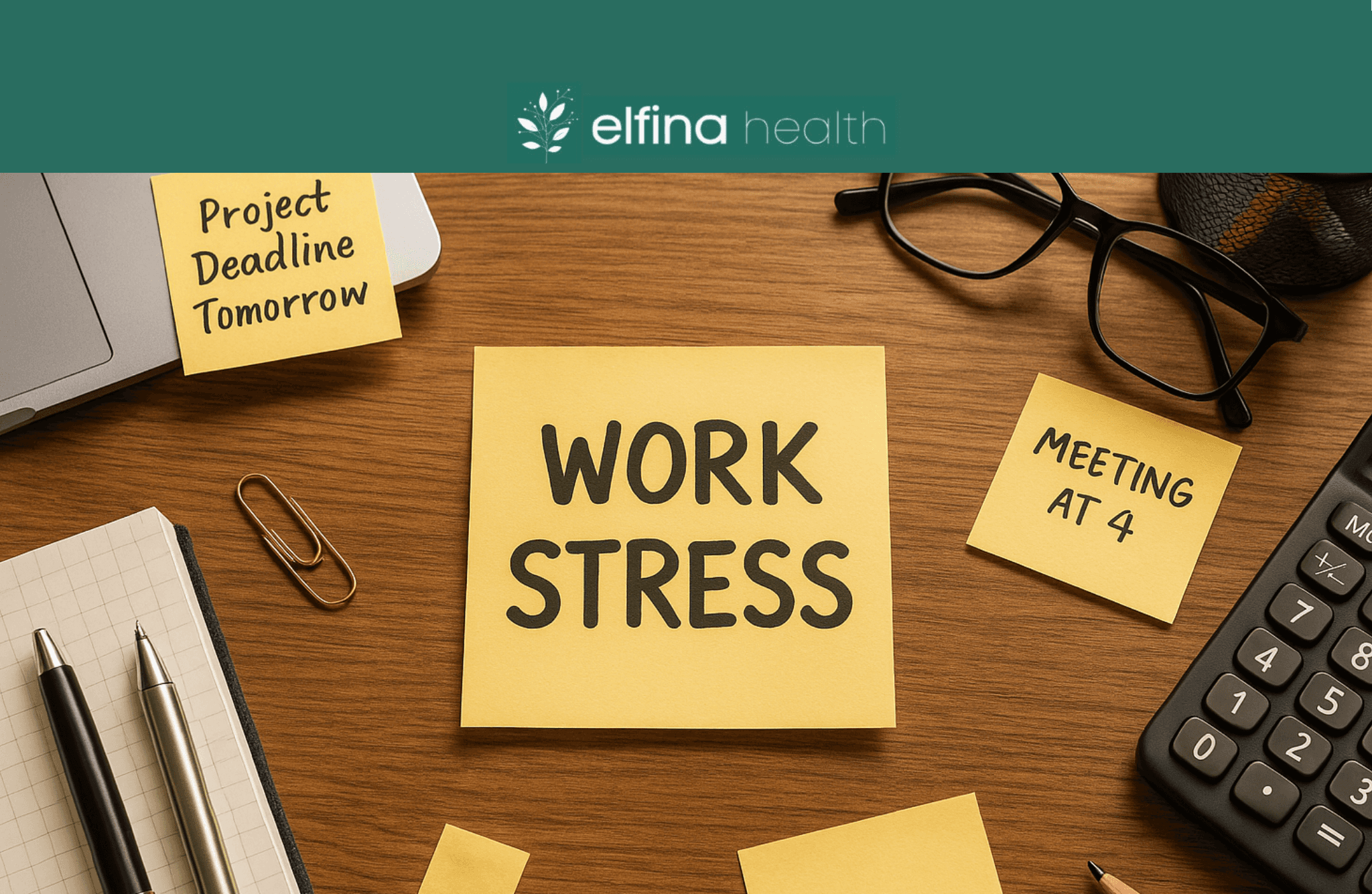

Burnout Isn’t Just a Buzzword - It’s a Wake-Up Call
Work is supposed to challenge you - not break you.
Yet for millions of Indians, the modern workplace has quietly become a source of anxiety, burnout, and emotional exhaustion.
In fact, 80% of Indian professionals say they’ve struggled with mental health issues over the past year, according to Deloitte. And the McKinsey Health Institute reports that India tops the global charts for workplace exhaustion, beating even Japan - with 62% of employees feeling drained just trying to keep up.
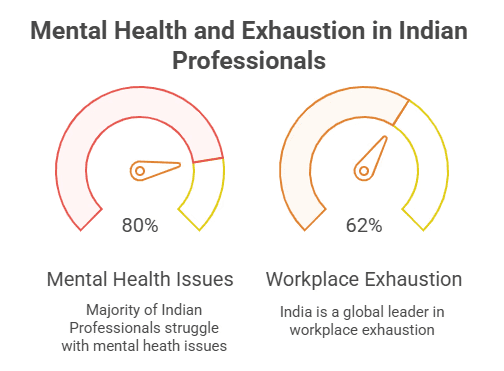
But here’s the thing:
Work stress isn’t just about tight deadlines or long hours. It chips away at your energy, disrupts your sleep, fogs your thinking, and leaves you feeling like you’re constantly running on empty.
The good news? You’re not powerless.
In this blog, we’ll explore how to spot the signs early, understand what’s really driving the pressure, and learn how both employees and employers can take steps to create a healthier work-life balance.
Because your mental health shouldn’t be the price you pay for a paycheck.
What Is Work-Related Stress?
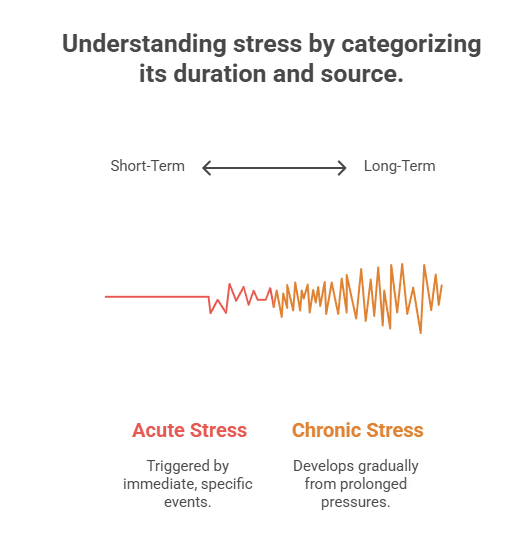
Work-related stress isn’t just “a bad day at the office.” It’s a real psychological response that occurs when job demands consistently exceed your capacity to cope - mentally, emotionally, or physically.
According to the World Health Organization (WHO),
“Work-related stress is the response people may have when presented with work demands and pressures that are not matched to their knowledge and abilities and which challenge their ability to cope.”
This kind of stress can be:
Acute – triggered by a specific situation or deadline
Chronic – building up over time due to ongoing pressures
Broader Risks to Mental Health at Work
The WHO also highlights several broader risks to mental health in the workplace, which may or may not cause stress directly but still impact well-being:
Under-use of skills or being under-skilled for the job
Understaffing or intense pace of work
Long, inflexible, or unsocial hours
Poor or unsafe physical conditions
Negative organizational culture or tolerance of bad behavior
Lack of support from supervisors or peers
Violence, harassment, or bullying
Discrimination or exclusion
Lack of job clarity or direction
Over- or under-promotion
Inadequate compensation or lack of career investment
Work-home life conflict
Understanding both direct stressors and underlying risk factors is key to preventing burnout and creating healthier work environments.
Signs of Work-Related Stress
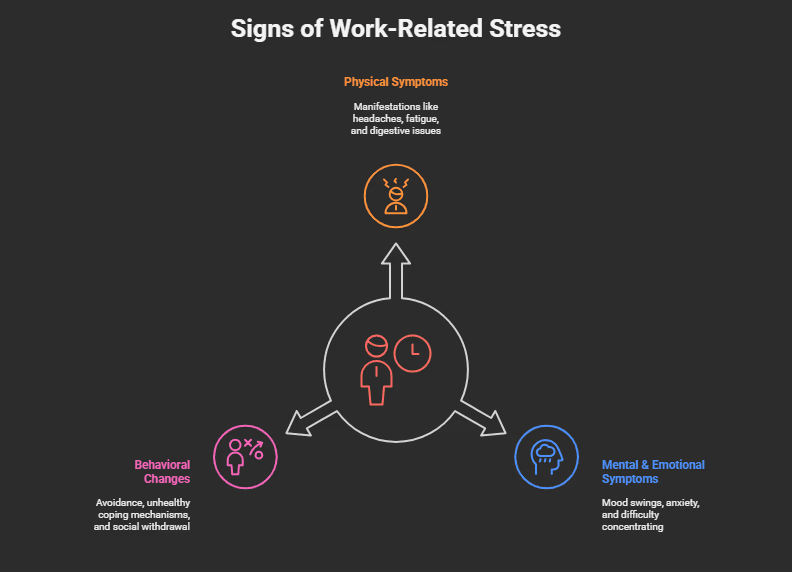
Work-related stress can begin subtly but, if left unaddressed, it can escalate, affecting both your physical health and cognitive abilities. It's important to identify the signs early to prevent long-term consequences.
Physical Symptoms
Work stress can take a serious toll on your body. You may notice:
Frequent headaches or migraines
Chronic fatigue, feeling tired no matter how much rest you get
Sleep disturbances, such as insomnia or poor-quality sleep
Muscle tension, particularly in the neck, shoulders, or back
Digestive issues, such as constipation, diarrhea, or indigestion
Chest tightness or pain, which can be mistaken for a heart-related issue
Sudden weight changes, either gaining or losing weight without explanation
Loss of sexual interest or other intimacy-related issues
These symptoms, often linked to stress, can sometimes signal more serious health problems like high blood pressure, heart disease, or digestive issues. The accumulation of stress over time - called "allostatic load" - can cause chronic physical symptoms that continue to affect your body long-term.
Mental & Emotional Symptoms
Stress doesn't just affect your body, it also impacts your mental and emotional well-being. Symptoms may include:
Mood swings: Feeling unusually irritable, anxious, or even angry
Increased anxiety or depression: Persistent feelings of worry, sadness, or hopelessness
Trouble concentrating: Difficulty staying focused on tasks or thinking clearly
Feelings of being overwhelmed: A sense that you're unable to cope or get things under control
Self-doubt and negative thinking: Overthinking your abilities or feeling unworthy
In addition to these, cognitive stress symptoms such as impaired working memory, attention, and response inhibition are common. Chronic stress can damage key brain areas like the prefrontal cortex (which helps with decision-making and problem-solving) and the caudate nucleus (which helps regulate cognitive flexibility). This can lead to difficulties in tasks that require focus, memory retention, or the ability to respond to changes effectively.
Behavioral Changes
Stress can also manifest in changes to your behavior:
Avoidance behavior: Putting off tasks or procrastinating more often
Increased use of unhealthy coping mechanisms, like alcohol, smoking, or overeating
Decreased work performance: A noticeable decline in quality, missed deadlines, or a lack of motivation
Social withdrawal: Avoiding colleagues or taking more sick days than usual
These behavioral signs often coincide with physical and emotional symptoms, and when all of these factors accumulate, they can significantly impact your productivity and overall health.
Common Causes of Work Stress
Work stress doesn’t come out of nowhere - it builds over time, often due to a combination of workplace conditions and personal responses. While different individuals may perceive stressors differently based on personality and coping style, some causes are widely recognized across workplaces:
Excessive Workload
Constantly juggling tasks, tight deadlines, and unrealistic expectations can wear down even the most resilient employees.
Lack of Control
Having little say in how or when you do your work leads to frustration and helplessness - especially when decisions are made without your input.
Micromanagement & Lack of Recognition
Feeling scrutinized or unappreciated for your efforts can erode morale and fuel stress over time.
Poor Work-Life Balance
When the lines between personal and professional life blur, burnout is only a matter of time.
Job Insecurity
Fear of layoffs, contract terminations, or uncertain career paths adds ongoing anxiety that distracts from performance.
Bullying, Harassment, or Discrimination
Toxic work cultures or interpersonal abuse are major mental health threats - and no one should have to tolerate them.
Lack of Support or Leadership
A poor social environment - such as distant coworkers or unsupportive managers - can leave you feeling isolated and overwhelmed.
Unpleasant or Hazardous Work Environment
Exposure to constant noise, overcrowding, poor air quality, or physically dangerous tasks adds a layer of stress that’s often ignored.
Monotonous or Unstimulating Work
Doing the same task every day without variety, challenge, or learning can also lead to mental fatigue and disengagement.
➡️ Understanding these root causes is the first step in creating a healthier, more supportive work environment.
Major Work Stressors
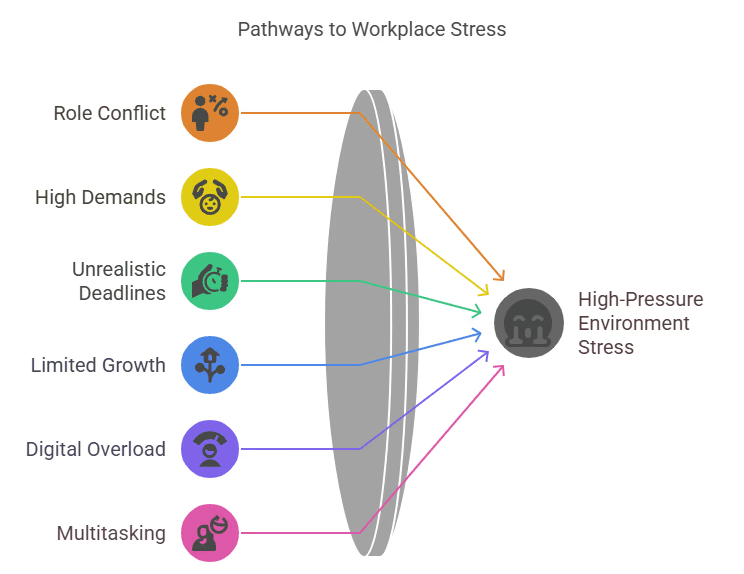
While causes of stress are broad, certain key stressors stand out as primary triggers in high-pressure environments:
Role Conflict or Ambiguity
Not knowing what’s expected of you - or being pulled in opposite directions - leads to confusion, second-guessing, and constant anxiety.
High Demands, Low Autonomy
Being overloaded with responsibilities but having no control over how to execute them is a classic recipe for workplace stress.
Unrealistic Deadlines
Chronically working against the clock, especially without the proper resources, builds a sense of failure and constant urgency.
Limited Growth Opportunities
A lack of career progression, upskilling, or internal mobility can make work feel stagnant and meaningless over time.
Digital Overload
Non-stop emails, Slack pings, meetings, and notifications - especially in remote or hybrid settings - can lead to cognitive exhaustion and decision fatigue.
Multitasking & Context Switching
Jumping from one task to another reduces focus and efficiency. Over time, this chips away at mental clarity and motivation.
➡️ Identifying these specific stressors helps employers and individuals target interventions more effectively.
When Coping Turns Costly: Unhealthy Reactions to Work Stress
Not all coping is healthy - and when stress simmers for too long, we often start reaching for quick fixes that can quietly damage our health, relationships, and peace of mind.
Chronic work-related stress can push individuals toward self-soothing behaviors that provide momentary relief - but come with long-term consequences. Harvard Health warns against the following unhealthy coping mechanisms:
Binge-watching TV or endlessly scrolling to escape reality
Withdrawing from loved ones - or overcompensating with a hyper-social lifestyle
Overeating, emotional eating, or sudden weight loss
Oversleeping to avoid facing the day, or suffering from insomnia
Increased alcohol consumption
Picking up or increasing smoking
Becoming emotionally volatile, irritable, or physically aggressive
Reliance on sleeping pills, muscle relaxants, anti-anxiety medication, or even illegal substances
What’s worse? Work stress rarely stays confined to office hours.
You may find yourself checking emails during dinner, replaying meetings in your head before bed, or rushing weekend errands like you're still chasing deadlines. When left unchecked, stress doesn't just live in your office - it moves into your mind, body, and home.
Recognizing these patterns early is crucial.
They’re not signs of weakness - they’re signals that you need care, not criticism.
Understanding Burnout
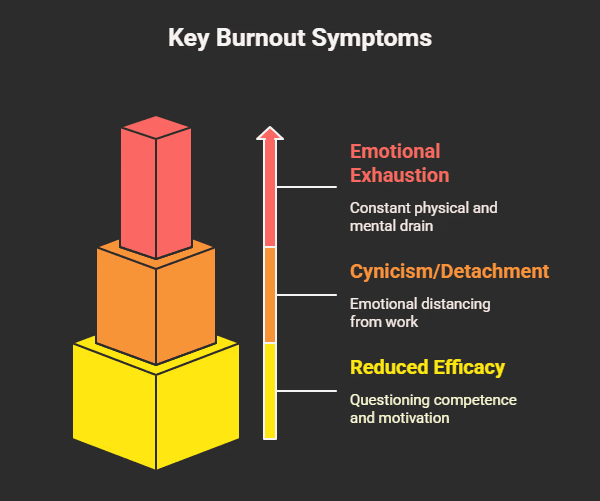
Burnout isn’t just feeling tired - it’s a clinical condition recognized by the World Health Organization (WHO) as an occupational phenomenon. It happens when work stress becomes chronic and remains unmanaged, leading to three key symptoms:
Emotional Exhaustion
You feel constantly drained, both physically and mentally - even after rest. The smallest tasks can feel overwhelming.
Cynicism or Detachment
You begin emotionally distancing yourself from your work. Colleagues may notice irritability, sarcasm, or a sudden lack of engagement.
Reduced Professional Efficacy
You start questioning your own competence and feel like nothing you do makes a difference. Confidence and motivation drop.
The American Psychological Association (APA) adds that burnout also includes negative attitudes toward oneself and others and is often the result of prolonged effort without proper recovery.
Consequences of burnout include:
Disengagement: You mentally “check out” from responsibilities and may feel little connection to your work.
Absenteeism & Turnover: Burnout is a major predictor of people calling in sick or leaving jobs altogether.
Health Deterioration: It can lead to physical symptoms (like somatic pain) and mental health concerns (like depression and anxiety)
➡️ Recognizing the warning signs of burnout can prevent long-term damage to both mental health and job performance.
Short-Term vs Long-Term Effects of Work Stress
Stress at work can feel like a low hum in the background - until it takes center stage. What starts as small daily pressures can silently snowball into serious consequences for both mind and body.
Short-Term Effects:
Low energy, frequent headaches, and irritability
Trouble concentrating or making decisions
Restless sleep or insomnia
Dips in performance and increased frustration
These are the red flags we often brush aside - but they’re your body’s way of asking for help.
Long-Term Effects:
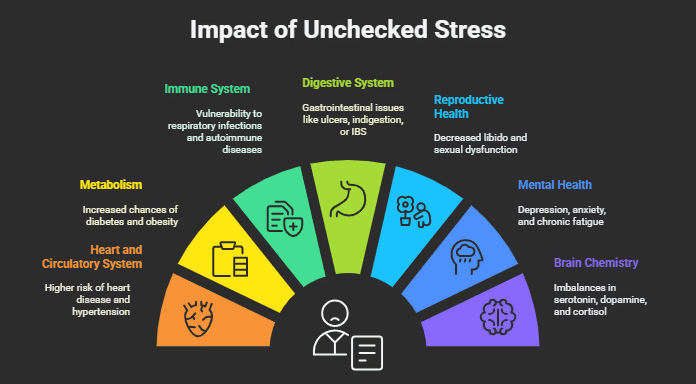
Unchecked work stress can strain nearly every system in your body:
Heart and circulatory system: Higher risk of heart disease and hypertension
Metabolism: Increased chances of diabetes and obesity
Immune system: Vulnerability to respiratory infections and autoimmune diseases
Digestive system: Gastrointestinal issues like ulcers, indigestion, or IBS
Reproductive health: Decreased libido and sexual dysfunction
Mental health: Depression, anxiety, and chronic fatigue
Behind the scenes, your brain and body are in overdrive. Prolonged stress activates the HPA axis, flooding your system with cortisol. Imbalances in cortisol levels are linked to mood changes and potentially depression. Prolonged stress can also disrupt the balance of brain chemicals like serotonin and dopamine, which regulate mood and energy - leaving you emotionally drained and physically vulnerable.
In short: stress isn’t “just stress.” It’s a full-body burden - and the longer it’s ignored, the louder it speaks.
The NIOSH Job Stress Model: A Mismatch with Consequences
According to the National Institute for Occupational Safety and Health (NIOSH), workplace stress is less about personal fragility - and more about the mismatch between job demands and the worker’s capacity to meet them.
NIOSH highlights how job stressors like unrealistic expectations, unsafe environments, or poor management can directly harm employee health and safety. But there’s more to the equation.
Individual and situational factors can either amplify or protect against these stressors:
A strong social support network (friends, coworkers) can be a buffer
A balanced life outside of work can build resilience
Personal factors, like personality traits or coping styles, can shift how stress is processed
Imagine two employees in the same role. One has supportive coworkers, flexible hours, and time for hobbies. The other is caregiving for a sick parent and lacks managerial support. The same job conditions will affect them very differently.
It’s not about being tough enough. It’s about the system being human enough.
How Work Stress Hurts Performance & Productivity
Work stress doesn’t just take a toll on your well-being - it slowly chips away at your performance too.
When you're under pressure, your brain’s working memory, attention span, and impulse control all suffer. Your body is in fight-or-flight mode - and your mind isn’t focused on innovation or teamwork, it's focused on survival.
What this looks like on the job:
You struggle to concentrate or retain information
Mistakes multiply, even in routine tasks
You become reactive instead of thoughtful in decision-making
Creativity declines, and collaboration feels draining
Motivation fades, morale dips, and turnover risk rises
Over time, this doesn’t just hurt individuals - it impacts the entire organization’s culture and productivity.
People don’t lose their potential - they lose their capacity when stress goes unmanaged.
How to Manage and Treat Work Stress
Managing work stress isn’t just about reacting in moments of burnout - it’s about building a personal and professional ecosystem that protects your mental well-being. That includes what you can do and what your employer should offer.
For Individuals:
Time management is crucial. Try the Pomodoro Technique (25 minutes of focused work followed by 5-minute breaks) to prevent burnout or use the Eisenhower Matrix to sort tasks by urgency and importance. These simple systems reduce overwhelm and increase clarity.
Mindfulness and meditation, even 10 minutes a day, can regulate stress hormones and improve emotional resilience.
Don’t underestimate the power of support - talk to colleagues or friends, and reach out when you feel isolated.
Set healthy boundaries - say no when needed, turn off notifications after work hours, and create a clear divide between work and personal life.
Physical wellness matters: exercise, nutritious food, and good sleep directly impact your mental health.
If things feel too heavy, don’t hesitate to reach out for professional help. Elfina provides online therapy tailored to stress, burnout, workplace anxiety, and career transitions - all in a confidential, culturally sensitive space.
For Employers and Managers:
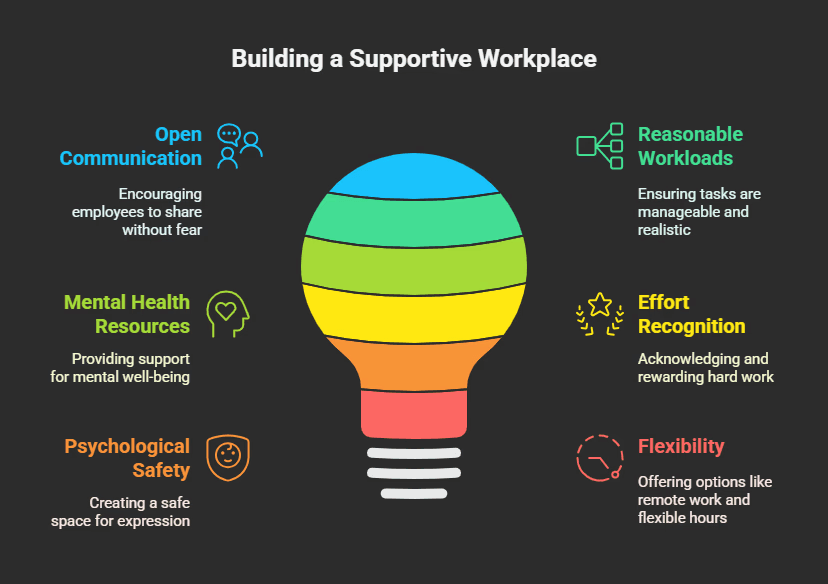
According to The Economic Times, 80% of employees say their company doesn’t offer stress management programs, even though 90% want them. Prevention starts with action - from both sides and organizations need to do better.
Here’s how:
Foster open communication. Let employees feel heard without fear of judgment or penalty.
Keep workloads reasonable and realistic, avoiding last-minute crunches and constant over-expectation.
Invest in mental health resources like Employee Assistance Programs (EAPs), counseling access, or stress workshops.
Recognize and reward effort, not just outcomes. Positive reinforcement builds morale.
Create a psychologically safe environment where people can express concerns or admit mistakes without backlash.
Offer flexibility - whether that’s work-from-home options, flexible hours, or mental health days.
To guide these efforts, refer to the HSE Management Standards, which identify six core workplace factors affecting stress:
Demands: workload, schedules, environment
Control: autonomy in how work is done
Support: access to help from managers and peers
Relationships: addressing conflict and promoting healthy dynamics
Role clarity: ensuring employees know what’s expected of them
Change: communicating organizational shifts clearly and supportively

Work stress isn’t inevitable - it’s preventable, if both sides take the right steps.
Home Remedies and Daily Habits for Prevention
You don’t need to wait for burnout to take care of your mental health. Small, consistent habits can serve as powerful protectors against stress - and they’re completely within your control.
Progressive muscle relaxation involves slowly tensing and releasing each muscle group to let go of physical tension caused by stress.
Yoga and deep breathing exercises reduce cortisol levels and activate your body’s calming system. They’re perfect for unwinding after a long day or centering before a big meeting.
Journaling or simply expressing your emotions helps declutter your thoughts and gives you perspective - think of it as a daily brain detox.
Take short breaks or walks between work sessions to reset your focus and avoid mental fatigue. Even five minutes can work wonders.
Limit caffeine intake and reduce screen time, especially before bed. Good sleep is one of the most underrated stress defenses.
Remember: Prevention is key. These daily rituals aren’t just “wellness hacks” - they’re your foundation for a calmer, clearer mind.
Therapy for Work-Related Stress: How Elfina Can Help
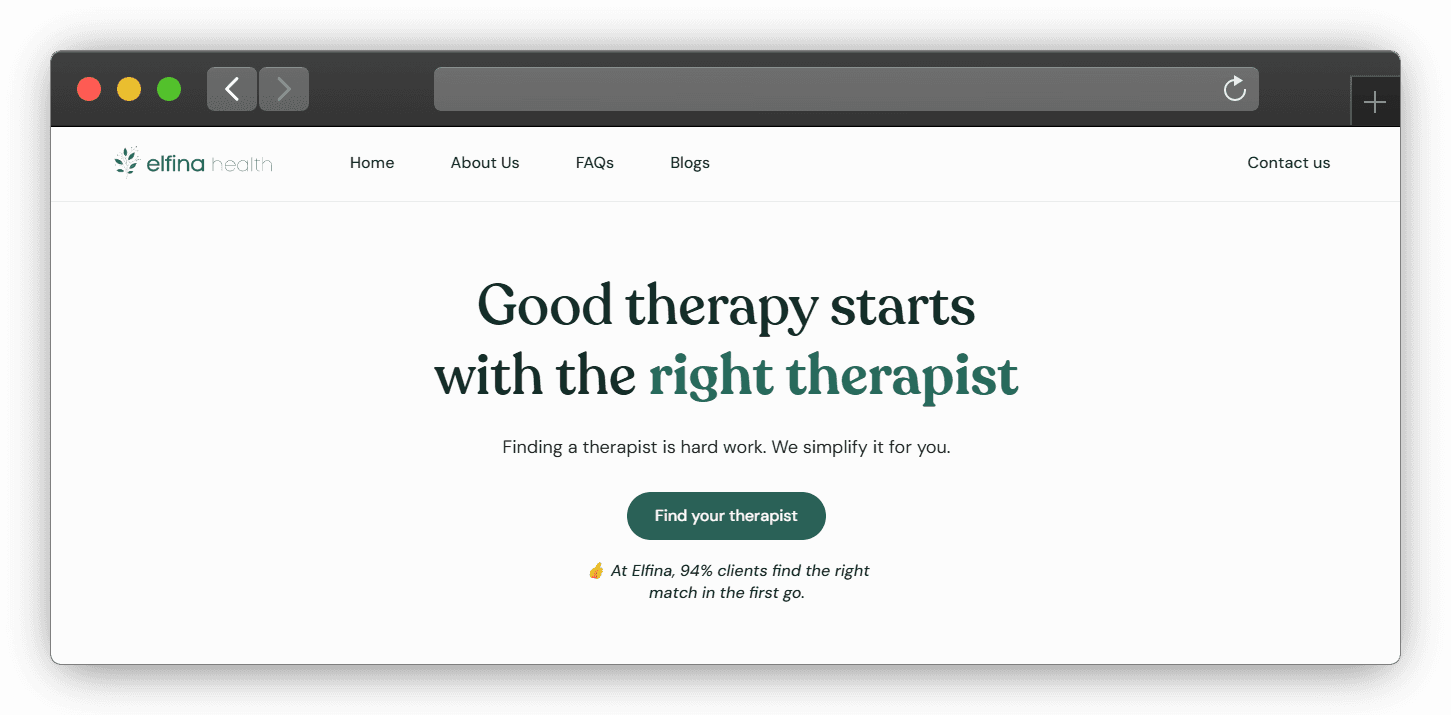
When deadlines pile up, burnout creeps in, or you're stuck in a toxic team dynamic, it's not just your job that suffers - it's your health, motivation, and peace of mind. That’s where Elfina steps in.
We’re a modern mental health platform designed to support Indian professionals through the real, raw struggles of workplace stress - without judgment, jargon, or pressure.
🌿 Why Choose Elfina?
Expertise You Can Trust:
Over 80% of our therapists are seasoned professionals with years of experience handling work-related anxiety, burnout, toxic work cultures, and career dilemmas.
Culturally Sensitive Therapy:
We get it - opening up isn’t easy, especially in Indian households or corporate setups. Our therapists are trained to respect your cultural values, family dynamics, and social expectations.
Completely Confidential & Online:
No need to take a sick day or explain your absence. Elfina offers secure, fully online therapy with flexible slots - mornings, evenings, or weekends - from the comfort of your space.
Affordable, Transparent Pricing:
Therapy shouldn’t be a luxury. We offer budget-friendly sessions with no hidden costs, no unnecessary packages, and you choose your therapist.
94% Success Rate in Therapist Matching:
94% of our clients find the right therapist on their first match. No more wasting time. No more feeling unheard. Get matched with an expert who understands your stress right away.
🧠 What Can We Help With?
Workplace anxiety, performance pressure, or fear of failure
Burnout, emotional exhaustion, or chronic fatigue
Toxic work cultures - from micromanagement to workplace bullying
Setting boundaries with colleagues, managers, or even family
Career confusion, transitions, or imposter syndrome
Rebuilding self-esteem and confidence
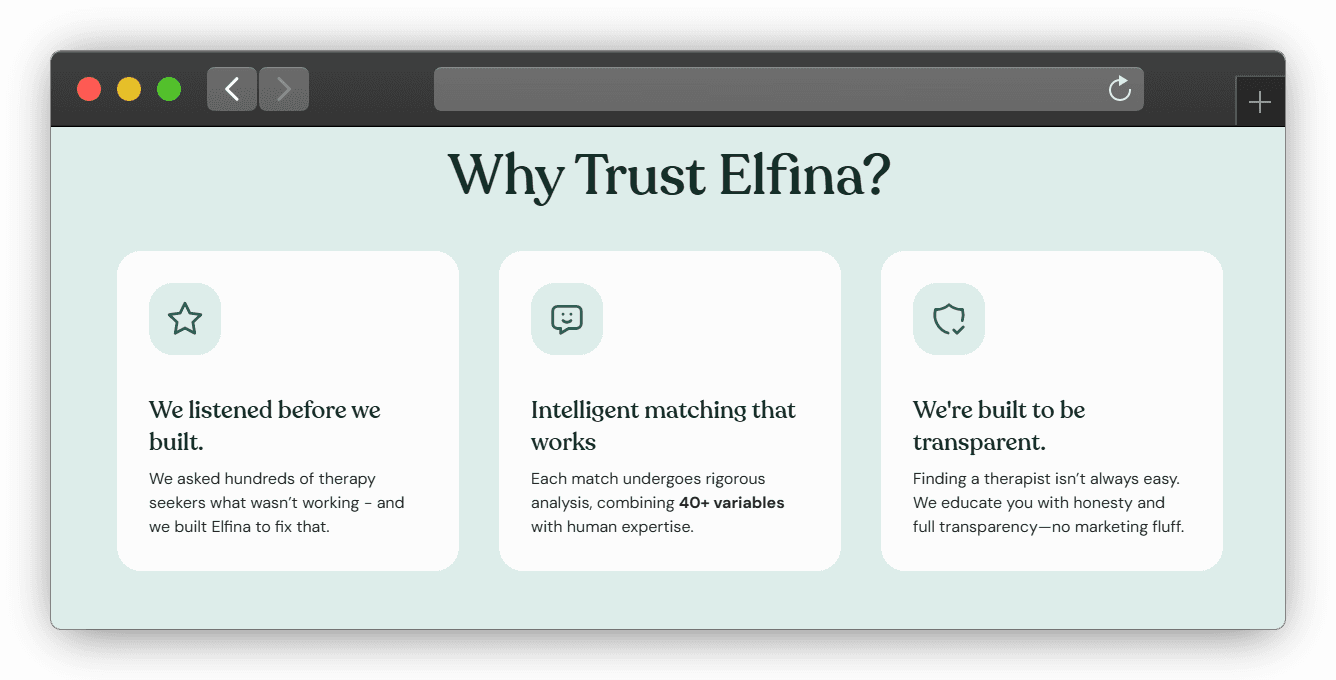
🛠️ How We Help – Evidence-Based, Personalized Support
Cognitive Behavioral Therapy (CBT): Reshape negative thinking and manage stress
Solution-Focused Therapy: Build immediate, practical coping strategies
Stress Management Training: Learn tools for emotional regulation, better sleep, and self-care
Support for boundary-setting, effective communication, and emotional resilience
You deserve to feel seen, heard, and supported - especially at work.
With Elfina, therapy is no longer intimidating. It’s relatable, relevant, and rooted in real-life experience.
Let’s take the first step - together.
Home Remedies and Daily Habits for Prevention
You don’t need to wait for burnout to take care of your mental health. Small, consistent habits can serve as powerful protectors against stress - and they’re completely within your control.
Progressive muscle relaxation involves slowly tensing and releasing each muscle group to let go of physical tension caused by stress.
Yoga and deep breathing exercises reduce cortisol levels and activate your body’s calming system. They’re perfect for unwinding after a long day or centering before a big meeting.
Journaling or simply expressing your emotions helps declutter your thoughts and gives you perspective - think of it as a daily brain detox.
Take short breaks or walks between work sessions to reset your focus and avoid mental fatigue. Even five minutes can work wonders.
Limit caffeine intake and reduce screen time, especially before bed. Good sleep is one of the most underrated stress defenses.
Remember: Prevention is key. These daily rituals aren’t just “wellness hacks” - they’re your foundation for a calmer, clearer mind.
FAQs – Answering Your Questions About Work Stress
What is work stress?
Work stress is the mental, physical, and emotional strain caused by job demands that exceed an individual's ability to cope. It can result from factors like heavy workload, poor work-life balance, lack of control, toxic work environments, and more.
What are 5 signs of work-related stress?
Fatigue or exhaustion: Constant tiredness, both physically and mentally.
Irritability or mood swings: Feeling agitated or easily frustrated.
Sleep disturbances: Difficulty falling asleep or staying asleep.
Decreased productivity: A noticeable decline in work performance or concentration.
Physical symptoms: Headaches, muscle tension, or gastrointestinal problems.
How to deal with work stress?
Managing work stress involves a mix of strategies such as setting realistic goals, prioritizing tasks, practicing mindfulness, taking breaks, and seeking professional support through therapy or counseling. Incorporating healthy lifestyle habits like exercise and good nutrition also helps.
What are 3 warning signs of stress?
Increased irritability or anxiety
Physical tension (e.g., headaches, back pain)
Social withdrawal or feeling disconnected from colleagues and work
Should I quit my job due to stress?
Quitting a job should be a well-considered decision. If the work stress is affecting your mental and physical health severely, it may be worth exploring other options. However, before making such a decision, consider seeking professional advice, adjusting your workload, or speaking with your employer about possible changes.
How to stop stress?
You can reduce stress through effective time management, setting boundaries, engaging in physical activities, practicing relaxation techniques (like deep breathing), and seeking support from colleagues, friends, or therapists.
What are 7 physical signs of stress?
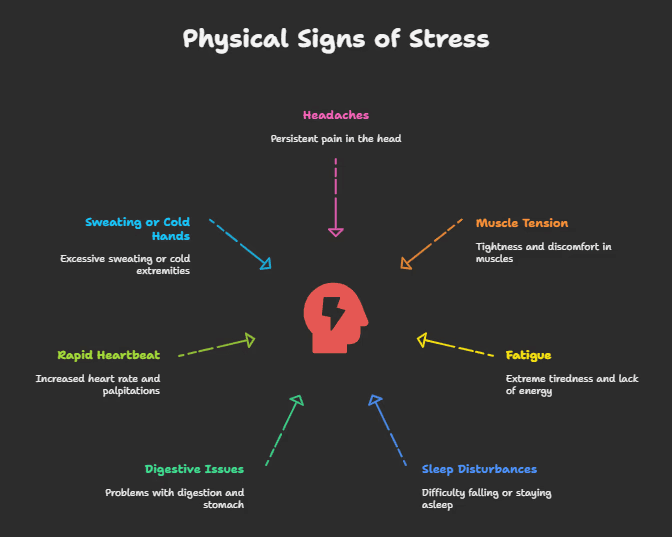
Headaches
Muscle tension
Fatigue
Sleep disturbances
Digestive issues
Rapid heartbeat
Sweating or cold hands
How to check stress level?
Stress levels can be assessed through self-reflection, recognizing signs of stress like irritability, sleep issues, and fatigue, or by using online stress tests. However, for a more accurate evaluation, seeking guidance from a therapist is recommended.
How do I identify my stress?
You can identify stress by observing physical symptoms (e.g., headaches, fatigue), emotional responses (e.g., irritability, anxiety), and changes in your behavior (e.g., procrastination, lack of focus). If these signs persist, it may be helpful to talk to a mental health professional for an in-depth assessment.
Conclusion: Don’t Let Work Steal Your Well-Being
Work stress is real - but it doesn’t have to run your life.
From silent burnout to sleepless nights, the effects can creep in fast. But with the right support and smart strategies, you can take back control.
Whether you’re an employee battling deadlines or a manager trying to build a resilient team - early action is everything.
At Elfina, we make mental health support simple, stigma-free, and tailored to your work-life reality.
With 80%+ experienced therapists, 94% first-match success, and culturally-sensitive online care, we help you find balance - without skipping a beat.
✨ Work is important. But your peace of mind? Non-negotiable.
Let’s fix the stress before it breaks you. Start your healing journey with Elfina today. 💙
Other blogs
Work Pressure Is Affecting Your Mental Health - Let’s Fix That
May 20, 2025
|
14
min read
|
Tanvi

Burnout Isn’t Just a Buzzword - It’s a Wake-Up Call
Work is supposed to challenge you - not break you.
Yet for millions of Indians, the modern workplace has quietly become a source of anxiety, burnout, and emotional exhaustion.
In fact, 80% of Indian professionals say they’ve struggled with mental health issues over the past year, according to Deloitte. And the McKinsey Health Institute reports that India tops the global charts for workplace exhaustion, beating even Japan - with 62% of employees feeling drained just trying to keep up.

But here’s the thing:
Work stress isn’t just about tight deadlines or long hours. It chips away at your energy, disrupts your sleep, fogs your thinking, and leaves you feeling like you’re constantly running on empty.
The good news? You’re not powerless.
In this blog, we’ll explore how to spot the signs early, understand what’s really driving the pressure, and learn how both employees and employers can take steps to create a healthier work-life balance.
Because your mental health shouldn’t be the price you pay for a paycheck.
What Is Work-Related Stress?

Work-related stress isn’t just “a bad day at the office.” It’s a real psychological response that occurs when job demands consistently exceed your capacity to cope - mentally, emotionally, or physically.
According to the World Health Organization (WHO),
“Work-related stress is the response people may have when presented with work demands and pressures that are not matched to their knowledge and abilities and which challenge their ability to cope.”
This kind of stress can be:
Acute – triggered by a specific situation or deadline
Chronic – building up over time due to ongoing pressures
Broader Risks to Mental Health at Work
The WHO also highlights several broader risks to mental health in the workplace, which may or may not cause stress directly but still impact well-being:
Under-use of skills or being under-skilled for the job
Understaffing or intense pace of work
Long, inflexible, or unsocial hours
Poor or unsafe physical conditions
Negative organizational culture or tolerance of bad behavior
Lack of support from supervisors or peers
Violence, harassment, or bullying
Discrimination or exclusion
Lack of job clarity or direction
Over- or under-promotion
Inadequate compensation or lack of career investment
Work-home life conflict
Understanding both direct stressors and underlying risk factors is key to preventing burnout and creating healthier work environments.
Signs of Work-Related Stress

Work-related stress can begin subtly but, if left unaddressed, it can escalate, affecting both your physical health and cognitive abilities. It's important to identify the signs early to prevent long-term consequences.
Physical Symptoms
Work stress can take a serious toll on your body. You may notice:
Frequent headaches or migraines
Chronic fatigue, feeling tired no matter how much rest you get
Sleep disturbances, such as insomnia or poor-quality sleep
Muscle tension, particularly in the neck, shoulders, or back
Digestive issues, such as constipation, diarrhea, or indigestion
Chest tightness or pain, which can be mistaken for a heart-related issue
Sudden weight changes, either gaining or losing weight without explanation
Loss of sexual interest or other intimacy-related issues
These symptoms, often linked to stress, can sometimes signal more serious health problems like high blood pressure, heart disease, or digestive issues. The accumulation of stress over time - called "allostatic load" - can cause chronic physical symptoms that continue to affect your body long-term.
Mental & Emotional Symptoms
Stress doesn't just affect your body, it also impacts your mental and emotional well-being. Symptoms may include:
Mood swings: Feeling unusually irritable, anxious, or even angry
Increased anxiety or depression: Persistent feelings of worry, sadness, or hopelessness
Trouble concentrating: Difficulty staying focused on tasks or thinking clearly
Feelings of being overwhelmed: A sense that you're unable to cope or get things under control
Self-doubt and negative thinking: Overthinking your abilities or feeling unworthy
In addition to these, cognitive stress symptoms such as impaired working memory, attention, and response inhibition are common. Chronic stress can damage key brain areas like the prefrontal cortex (which helps with decision-making and problem-solving) and the caudate nucleus (which helps regulate cognitive flexibility). This can lead to difficulties in tasks that require focus, memory retention, or the ability to respond to changes effectively.
Behavioral Changes
Stress can also manifest in changes to your behavior:
Avoidance behavior: Putting off tasks or procrastinating more often
Increased use of unhealthy coping mechanisms, like alcohol, smoking, or overeating
Decreased work performance: A noticeable decline in quality, missed deadlines, or a lack of motivation
Social withdrawal: Avoiding colleagues or taking more sick days than usual
These behavioral signs often coincide with physical and emotional symptoms, and when all of these factors accumulate, they can significantly impact your productivity and overall health.
Common Causes of Work Stress
Work stress doesn’t come out of nowhere - it builds over time, often due to a combination of workplace conditions and personal responses. While different individuals may perceive stressors differently based on personality and coping style, some causes are widely recognized across workplaces:
Excessive Workload
Constantly juggling tasks, tight deadlines, and unrealistic expectations can wear down even the most resilient employees.
Lack of Control
Having little say in how or when you do your work leads to frustration and helplessness - especially when decisions are made without your input.
Micromanagement & Lack of Recognition
Feeling scrutinized or unappreciated for your efforts can erode morale and fuel stress over time.
Poor Work-Life Balance
When the lines between personal and professional life blur, burnout is only a matter of time.
Job Insecurity
Fear of layoffs, contract terminations, or uncertain career paths adds ongoing anxiety that distracts from performance.
Bullying, Harassment, or Discrimination
Toxic work cultures or interpersonal abuse are major mental health threats - and no one should have to tolerate them.
Lack of Support or Leadership
A poor social environment - such as distant coworkers or unsupportive managers - can leave you feeling isolated and overwhelmed.
Unpleasant or Hazardous Work Environment
Exposure to constant noise, overcrowding, poor air quality, or physically dangerous tasks adds a layer of stress that’s often ignored.
Monotonous or Unstimulating Work
Doing the same task every day without variety, challenge, or learning can also lead to mental fatigue and disengagement.
➡️ Understanding these root causes is the first step in creating a healthier, more supportive work environment.
Major Work Stressors

While causes of stress are broad, certain key stressors stand out as primary triggers in high-pressure environments:
Role Conflict or Ambiguity
Not knowing what’s expected of you - or being pulled in opposite directions - leads to confusion, second-guessing, and constant anxiety.
High Demands, Low Autonomy
Being overloaded with responsibilities but having no control over how to execute them is a classic recipe for workplace stress.
Unrealistic Deadlines
Chronically working against the clock, especially without the proper resources, builds a sense of failure and constant urgency.
Limited Growth Opportunities
A lack of career progression, upskilling, or internal mobility can make work feel stagnant and meaningless over time.
Digital Overload
Non-stop emails, Slack pings, meetings, and notifications - especially in remote or hybrid settings - can lead to cognitive exhaustion and decision fatigue.
Multitasking & Context Switching
Jumping from one task to another reduces focus and efficiency. Over time, this chips away at mental clarity and motivation.
➡️ Identifying these specific stressors helps employers and individuals target interventions more effectively.
When Coping Turns Costly: Unhealthy Reactions to Work Stress
Not all coping is healthy - and when stress simmers for too long, we often start reaching for quick fixes that can quietly damage our health, relationships, and peace of mind.
Chronic work-related stress can push individuals toward self-soothing behaviors that provide momentary relief - but come with long-term consequences. Harvard Health warns against the following unhealthy coping mechanisms:
Binge-watching TV or endlessly scrolling to escape reality
Withdrawing from loved ones - or overcompensating with a hyper-social lifestyle
Overeating, emotional eating, or sudden weight loss
Oversleeping to avoid facing the day, or suffering from insomnia
Increased alcohol consumption
Picking up or increasing smoking
Becoming emotionally volatile, irritable, or physically aggressive
Reliance on sleeping pills, muscle relaxants, anti-anxiety medication, or even illegal substances
What’s worse? Work stress rarely stays confined to office hours.
You may find yourself checking emails during dinner, replaying meetings in your head before bed, or rushing weekend errands like you're still chasing deadlines. When left unchecked, stress doesn't just live in your office - it moves into your mind, body, and home.
Recognizing these patterns early is crucial.
They’re not signs of weakness - they’re signals that you need care, not criticism.
Understanding Burnout

Burnout isn’t just feeling tired - it’s a clinical condition recognized by the World Health Organization (WHO) as an occupational phenomenon. It happens when work stress becomes chronic and remains unmanaged, leading to three key symptoms:
Emotional Exhaustion
You feel constantly drained, both physically and mentally - even after rest. The smallest tasks can feel overwhelming.
Cynicism or Detachment
You begin emotionally distancing yourself from your work. Colleagues may notice irritability, sarcasm, or a sudden lack of engagement.
Reduced Professional Efficacy
You start questioning your own competence and feel like nothing you do makes a difference. Confidence and motivation drop.
The American Psychological Association (APA) adds that burnout also includes negative attitudes toward oneself and others and is often the result of prolonged effort without proper recovery.
Consequences of burnout include:
Disengagement: You mentally “check out” from responsibilities and may feel little connection to your work.
Absenteeism & Turnover: Burnout is a major predictor of people calling in sick or leaving jobs altogether.
Health Deterioration: It can lead to physical symptoms (like somatic pain) and mental health concerns (like depression and anxiety)
➡️ Recognizing the warning signs of burnout can prevent long-term damage to both mental health and job performance.
Short-Term vs Long-Term Effects of Work Stress
Stress at work can feel like a low hum in the background - until it takes center stage. What starts as small daily pressures can silently snowball into serious consequences for both mind and body.
Short-Term Effects:
Low energy, frequent headaches, and irritability
Trouble concentrating or making decisions
Restless sleep or insomnia
Dips in performance and increased frustration
These are the red flags we often brush aside - but they’re your body’s way of asking for help.
Long-Term Effects:

Unchecked work stress can strain nearly every system in your body:
Heart and circulatory system: Higher risk of heart disease and hypertension
Metabolism: Increased chances of diabetes and obesity
Immune system: Vulnerability to respiratory infections and autoimmune diseases
Digestive system: Gastrointestinal issues like ulcers, indigestion, or IBS
Reproductive health: Decreased libido and sexual dysfunction
Mental health: Depression, anxiety, and chronic fatigue
Behind the scenes, your brain and body are in overdrive. Prolonged stress activates the HPA axis, flooding your system with cortisol. Imbalances in cortisol levels are linked to mood changes and potentially depression. Prolonged stress can also disrupt the balance of brain chemicals like serotonin and dopamine, which regulate mood and energy - leaving you emotionally drained and physically vulnerable.
In short: stress isn’t “just stress.” It’s a full-body burden - and the longer it’s ignored, the louder it speaks.
The NIOSH Job Stress Model: A Mismatch with Consequences
According to the National Institute for Occupational Safety and Health (NIOSH), workplace stress is less about personal fragility - and more about the mismatch between job demands and the worker’s capacity to meet them.
NIOSH highlights how job stressors like unrealistic expectations, unsafe environments, or poor management can directly harm employee health and safety. But there’s more to the equation.
Individual and situational factors can either amplify or protect against these stressors:
A strong social support network (friends, coworkers) can be a buffer
A balanced life outside of work can build resilience
Personal factors, like personality traits or coping styles, can shift how stress is processed
Imagine two employees in the same role. One has supportive coworkers, flexible hours, and time for hobbies. The other is caregiving for a sick parent and lacks managerial support. The same job conditions will affect them very differently.
It’s not about being tough enough. It’s about the system being human enough.
How Work Stress Hurts Performance & Productivity
Work stress doesn’t just take a toll on your well-being - it slowly chips away at your performance too.
When you're under pressure, your brain’s working memory, attention span, and impulse control all suffer. Your body is in fight-or-flight mode - and your mind isn’t focused on innovation or teamwork, it's focused on survival.
What this looks like on the job:
You struggle to concentrate or retain information
Mistakes multiply, even in routine tasks
You become reactive instead of thoughtful in decision-making
Creativity declines, and collaboration feels draining
Motivation fades, morale dips, and turnover risk rises
Over time, this doesn’t just hurt individuals - it impacts the entire organization’s culture and productivity.
People don’t lose their potential - they lose their capacity when stress goes unmanaged.
How to Manage and Treat Work Stress
Managing work stress isn’t just about reacting in moments of burnout - it’s about building a personal and professional ecosystem that protects your mental well-being. That includes what you can do and what your employer should offer.
For Individuals:
Time management is crucial. Try the Pomodoro Technique (25 minutes of focused work followed by 5-minute breaks) to prevent burnout or use the Eisenhower Matrix to sort tasks by urgency and importance. These simple systems reduce overwhelm and increase clarity.
Mindfulness and meditation, even 10 minutes a day, can regulate stress hormones and improve emotional resilience.
Don’t underestimate the power of support - talk to colleagues or friends, and reach out when you feel isolated.
Set healthy boundaries - say no when needed, turn off notifications after work hours, and create a clear divide between work and personal life.
Physical wellness matters: exercise, nutritious food, and good sleep directly impact your mental health.
If things feel too heavy, don’t hesitate to reach out for professional help. Elfina provides online therapy tailored to stress, burnout, workplace anxiety, and career transitions - all in a confidential, culturally sensitive space.
For Employers and Managers:

According to The Economic Times, 80% of employees say their company doesn’t offer stress management programs, even though 90% want them. Prevention starts with action - from both sides and organizations need to do better.
Here’s how:
Foster open communication. Let employees feel heard without fear of judgment or penalty.
Keep workloads reasonable and realistic, avoiding last-minute crunches and constant over-expectation.
Invest in mental health resources like Employee Assistance Programs (EAPs), counseling access, or stress workshops.
Recognize and reward effort, not just outcomes. Positive reinforcement builds morale.
Create a psychologically safe environment where people can express concerns or admit mistakes without backlash.
Offer flexibility - whether that’s work-from-home options, flexible hours, or mental health days.
To guide these efforts, refer to the HSE Management Standards, which identify six core workplace factors affecting stress:
Demands: workload, schedules, environment
Control: autonomy in how work is done
Support: access to help from managers and peers
Relationships: addressing conflict and promoting healthy dynamics
Role clarity: ensuring employees know what’s expected of them
Change: communicating organizational shifts clearly and supportively

Work stress isn’t inevitable - it’s preventable, if both sides take the right steps.
Home Remedies and Daily Habits for Prevention
You don’t need to wait for burnout to take care of your mental health. Small, consistent habits can serve as powerful protectors against stress - and they’re completely within your control.
Progressive muscle relaxation involves slowly tensing and releasing each muscle group to let go of physical tension caused by stress.
Yoga and deep breathing exercises reduce cortisol levels and activate your body’s calming system. They’re perfect for unwinding after a long day or centering before a big meeting.
Journaling or simply expressing your emotions helps declutter your thoughts and gives you perspective - think of it as a daily brain detox.
Take short breaks or walks between work sessions to reset your focus and avoid mental fatigue. Even five minutes can work wonders.
Limit caffeine intake and reduce screen time, especially before bed. Good sleep is one of the most underrated stress defenses.
Remember: Prevention is key. These daily rituals aren’t just “wellness hacks” - they’re your foundation for a calmer, clearer mind.
Therapy for Work-Related Stress: How Elfina Can Help

When deadlines pile up, burnout creeps in, or you're stuck in a toxic team dynamic, it's not just your job that suffers - it's your health, motivation, and peace of mind. That’s where Elfina steps in.
We’re a modern mental health platform designed to support Indian professionals through the real, raw struggles of workplace stress - without judgment, jargon, or pressure.
🌿 Why Choose Elfina?
Expertise You Can Trust:
Over 80% of our therapists are seasoned professionals with years of experience handling work-related anxiety, burnout, toxic work cultures, and career dilemmas.
Culturally Sensitive Therapy:
We get it - opening up isn’t easy, especially in Indian households or corporate setups. Our therapists are trained to respect your cultural values, family dynamics, and social expectations.
Completely Confidential & Online:
No need to take a sick day or explain your absence. Elfina offers secure, fully online therapy with flexible slots - mornings, evenings, or weekends - from the comfort of your space.
Affordable, Transparent Pricing:
Therapy shouldn’t be a luxury. We offer budget-friendly sessions with no hidden costs, no unnecessary packages, and you choose your therapist.
94% Success Rate in Therapist Matching:
94% of our clients find the right therapist on their first match. No more wasting time. No more feeling unheard. Get matched with an expert who understands your stress right away.
🧠 What Can We Help With?
Workplace anxiety, performance pressure, or fear of failure
Burnout, emotional exhaustion, or chronic fatigue
Toxic work cultures - from micromanagement to workplace bullying
Setting boundaries with colleagues, managers, or even family
Career confusion, transitions, or imposter syndrome
Rebuilding self-esteem and confidence

🛠️ How We Help – Evidence-Based, Personalized Support
Cognitive Behavioral Therapy (CBT): Reshape negative thinking and manage stress
Solution-Focused Therapy: Build immediate, practical coping strategies
Stress Management Training: Learn tools for emotional regulation, better sleep, and self-care
Support for boundary-setting, effective communication, and emotional resilience
You deserve to feel seen, heard, and supported - especially at work.
With Elfina, therapy is no longer intimidating. It’s relatable, relevant, and rooted in real-life experience.
Let’s take the first step - together.
Home Remedies and Daily Habits for Prevention
You don’t need to wait for burnout to take care of your mental health. Small, consistent habits can serve as powerful protectors against stress - and they’re completely within your control.
Progressive muscle relaxation involves slowly tensing and releasing each muscle group to let go of physical tension caused by stress.
Yoga and deep breathing exercises reduce cortisol levels and activate your body’s calming system. They’re perfect for unwinding after a long day or centering before a big meeting.
Journaling or simply expressing your emotions helps declutter your thoughts and gives you perspective - think of it as a daily brain detox.
Take short breaks or walks between work sessions to reset your focus and avoid mental fatigue. Even five minutes can work wonders.
Limit caffeine intake and reduce screen time, especially before bed. Good sleep is one of the most underrated stress defenses.
Remember: Prevention is key. These daily rituals aren’t just “wellness hacks” - they’re your foundation for a calmer, clearer mind.
FAQs – Answering Your Questions About Work Stress
What is work stress?
Work stress is the mental, physical, and emotional strain caused by job demands that exceed an individual's ability to cope. It can result from factors like heavy workload, poor work-life balance, lack of control, toxic work environments, and more.
What are 5 signs of work-related stress?
Fatigue or exhaustion: Constant tiredness, both physically and mentally.
Irritability or mood swings: Feeling agitated or easily frustrated.
Sleep disturbances: Difficulty falling asleep or staying asleep.
Decreased productivity: A noticeable decline in work performance or concentration.
Physical symptoms: Headaches, muscle tension, or gastrointestinal problems.
How to deal with work stress?
Managing work stress involves a mix of strategies such as setting realistic goals, prioritizing tasks, practicing mindfulness, taking breaks, and seeking professional support through therapy or counseling. Incorporating healthy lifestyle habits like exercise and good nutrition also helps.
What are 3 warning signs of stress?
Increased irritability or anxiety
Physical tension (e.g., headaches, back pain)
Social withdrawal or feeling disconnected from colleagues and work
Should I quit my job due to stress?
Quitting a job should be a well-considered decision. If the work stress is affecting your mental and physical health severely, it may be worth exploring other options. However, before making such a decision, consider seeking professional advice, adjusting your workload, or speaking with your employer about possible changes.
How to stop stress?
You can reduce stress through effective time management, setting boundaries, engaging in physical activities, practicing relaxation techniques (like deep breathing), and seeking support from colleagues, friends, or therapists.
What are 7 physical signs of stress?

Headaches
Muscle tension
Fatigue
Sleep disturbances
Digestive issues
Rapid heartbeat
Sweating or cold hands
How to check stress level?
Stress levels can be assessed through self-reflection, recognizing signs of stress like irritability, sleep issues, and fatigue, or by using online stress tests. However, for a more accurate evaluation, seeking guidance from a therapist is recommended.
How do I identify my stress?
You can identify stress by observing physical symptoms (e.g., headaches, fatigue), emotional responses (e.g., irritability, anxiety), and changes in your behavior (e.g., procrastination, lack of focus). If these signs persist, it may be helpful to talk to a mental health professional for an in-depth assessment.
Conclusion: Don’t Let Work Steal Your Well-Being
Work stress is real - but it doesn’t have to run your life.
From silent burnout to sleepless nights, the effects can creep in fast. But with the right support and smart strategies, you can take back control.
Whether you’re an employee battling deadlines or a manager trying to build a resilient team - early action is everything.
At Elfina, we make mental health support simple, stigma-free, and tailored to your work-life reality.
With 80%+ experienced therapists, 94% first-match success, and culturally-sensitive online care, we help you find balance - without skipping a beat.
✨ Work is important. But your peace of mind? Non-negotiable.
Let’s fix the stress before it breaks you. Start your healing journey with Elfina today. 💙
Other blogs
Frequently Asked Questions
What types of therapy do you offer?
Can I meet my therapist in-person?
How do you match me with a therapist?
How much does therapy cost?
Do you offer free trials?
Finding The Right Fit, Made Easy
© Mindaro Health Technologies. All rights reserved
© Mindaro Health Technologies. All rights reserved
Finding the right fit, made easy.
FAQs
What types of therapy do you offer?
What types of therapy do you offer?
Can I meet my therapist in-person?
Can I meet my therapist in-person?
How do you match me with a therapist?
How do you match me with a therapist?
How much does therapy cost?
How much does therapy cost?
Do you offer free trials?
Do you offer free trials?







